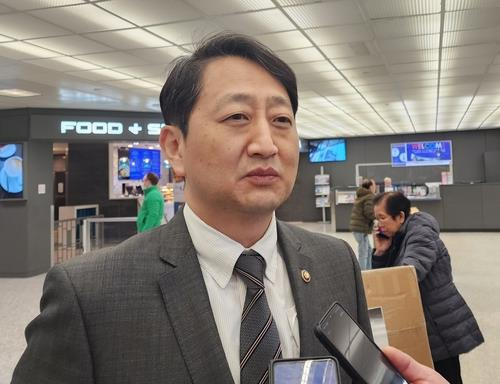S. Korea, US to discuss 'concerns' over US Chips Act: trade minister
By YonhapPublished : March 9, 2023 - 09:22

WASHINGTON -- There exist concerns over the United States' Chips and Science Act that it may require too much information in exchange for US government subsidies, South Korea's Trade Minister Ahn Duk-geun said Wednesday.
Ahn said he plans to discuss such concerns with his US counterparts after arriving in Washington on a three-day visit.
"The two governments of South Korea, the US and their industrial sectors have been working together to build a semiconductor supply chain, but there now exist concerns" due to the recently published details of the Chips and Science Act, Ahn told reporters.
The US announced details of the act last week that will provide up to $52.7 billion in subsidies, along with tax incentives, to chipmakers who set up production facilities in the US
Those that receive US subsidies will be barred from making new investments to produce chips in China for the next decade, while they are required to take part in US research and development projects and share any excess profit.
"This is a highly volatile industry, and so issues related to demanding too much information or restrictions with regard to operations in China may cause serious problems depending on how they are implemented in the future," said Ahn.
Samsung Electronics Co. and SK hynix Inc., the world's leading memory chip makers based in South Korea, already have significant semiconductor manufacturing operations in China.
Alan Estevez, under secretary of commerce for industry and security, earlier said the South Korean firms will likely have limits to grow to certain "levels" in China under the US act.
He also said the South Korean chipmakers will likely be asked to limit the level of advanced semiconductors they produce in China.
"We will try to be as reasonable as possible in those areas," said Ahn. "We will work to explain our business conditions (in China) as thoroughly as possible and create as much safety net as possible so they will not be a problem." (Yonhap)



















